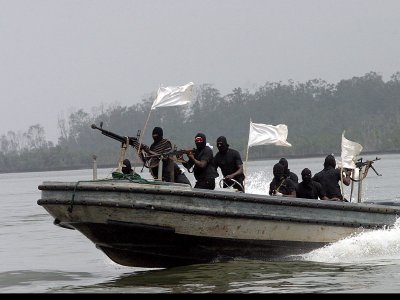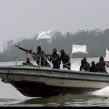
Is the Trans-Sahara Gas Pipeline a Viable Project? The Impact of Terrorism Risk
Publication: Terrorism Monitor Volume: 7 Issue: 25
By:

The projected construction of the 4,000 km Trans-Sahara Gas Pipeline (TSGP) will be one of Africa’s most ambitious infrastructure projects. However, the risk of terrorism could seriously undermine the profitability of this enterprise, raising costs beyond current expectations.
The Trans-Sahara Gas Pipleine: What is at Stake?
On July 3, Algeria, Nigeria and Niger signed an intergovernmental agreement for the development of a 4,128 km gas pipeline that will send gas from the Niger Delta through Niger to Algeria’s export terminals. The project is estimated to cost around $12 billion and will supply up to 30 billion cubic meters of natural gas per year to Europe; in addition, it will enable Nigeria to increase its share of natural gas exports, while helping make Algeria one of the major energy hubs in the region, catering mainly to the European market.
The European Union supports the program and considers the building of the TSGP crucial to the diversification of its energy resources. The pipeline would enable European countries to tap directly into Nigeria’s 5 trillion cubic meters of natural gas and reduce its reliance on Russia and Algeria (although Algeria’s Sonatrach and, potentially, Russia’s Gazprom will also be involved in the TSGP project). Unsurprisingly, various European energy companies have already expressed an interest in the project; France’s Total, Russia’s Gazprom, Anglo-Dutch Shell and Italy’s ENI have indicated that they are ready to take part (El Watan, July 29).
However, several doubts weigh on the building of the TSGP, despite a study carried out by Penspen and IPA Energy Consulting in 2006 that found the pipeline technically and economically feasible. First, the TSGP will be the world’s longest pipeline; much of the construction will take place in one of world’s most difficult environments, the Sahara desert, significantly raising costs. Second, developing Nigeria’s liquefied natural gas (LNG) industry would probably be a less expensive and more efficient way to export the country’s natural gas resources. Third, the TSGP is a highly speculative project and it will not be easy to find private partners willing to commit to such an unpredictable enterprise. It would take just one major incident to halt construction work and increase costs beyond profitability.
The Terrorism Threat to the TSGP: Nigeria
However, the most significant obstacle to this massive project is the issue of security in the countries through which the pipeline will run. Nigeria, Niger and Algeria are among the least secure areas of the world because of the various guerrilla and terrorist movements that destabilize them; security risk, along with the speculative nature of this project, means that even a small-scale attack could seriously impair or delay the completion of the pipeline, dramatically raising costs for the companies involved.
The most serious threat so far has emerged in Nigeria, the originating point of the resources that will be transported through the pipeline to Europe. Soon after the signing of the agreement, the Movement for the Emancipation of the Niger Delta (MEND) threatened to thwart the project by sabotaging the construction works (AFP, July 4). MEND has already successfully attacked Nigeria’s oil and gas infrastructure and has been active in kidnapping foreign oil workers. The latest episode occurred on July 13, when militants in speedboats assaulted an oil distribution point in Lagos, killing several sailors on guard and using dynamite charges to destroy ten pipelines at the terminal. Security forces did not intervene to prevent MEND from striking at one of Nigeria’s main oil terminals (see Terrorism Monitor, July 27).
MEND’s terrorist attacks are the main cause of Nigeria’s falling levels of oil production. According to government officials, Nigeria’s oil production has declined by 1 million barrels per day (b/d) and is now close to 1.4 million b/d, well below its potential of 2.3 million. Royal Dutch Shell declared that its output was down 35% in July (UPI, July 22). In this context, it is hard not to take MEND’s threats to the TSGP pipeline seriously, as 1,037 km of its track will run through Nigeria from the coast to the border with Niger. If government and private security forces are unable to protect the country’s oil infrastructure in Lagos, the protection of a 1,037km-long pipeline will be even harder, again affecting the costs and economic viability of the plan.
The Terrorism Threat to the TSGP: the Sahel region
However, MEND does not represent the only security risk to the TSGP project. 3,151 km of the pipeline (around 76% of the total distance covered) will be laid down in Niger and Algeria, where two more major threats are likely to complicate further the realization of the project. This area is known as the Sahel, a semi-arid strip of land between the Sahara desert and Sub-Saharan Africa where various insurgencies and terrorism groups have been active in recent years, raising fears in the West of a new "safe haven" for Islamist militants.
Niger has been the scene of major uprisings by Tuareg guerrilla movements in the 1990s and more recently between 2007 and 2009. The latest conflict was only halted by a ceasefire in May that followed a split within the major rebel organization, Le Mouvement des Nigeriens pour la Justice (MNJ). The MNJ includes disgruntled members of various semi-nomadic tribes in northern Niger, although it is mostly identified with the local Tuareg population (see Terrorism Focus, July 31, 2007).
In past years the MNJ has been able to attack some of the country’s infrastructure and kidnap a Chinese nuclear engineer and four French employees from the nuclear energy company Areva. The movement concentrated on hitting the uranium industry, disrupting its production and targeting its officials, engineers and employees, with the movement demanding a fairer share of the profits generated by this sector and more environmental protection. Although the insurgency has wound down and talks between government and rebels are gradually leading to the end of the insurrection, security risks cannot be discounted yet; in the event of renewed hostilities, not only the uranium industry, but the new TSGP pipeline could become a target for Tuareg rebels as well.
Another major source of concern has been the alleged collaboration between the MNJ and the southern branch of al-Qaeda in the Islamic Maghreb (AQIM). This threat is likely overstated and recently cooperation between local Tuareg tribes and the government against AQIM was reported in Mali (Aurore [Bamako], July 20). More interesting, however, is the increasing number of incidents in this area in which AQIM has been involved lately.
In recent months AQIM’s Southern Zone command has been very active in the Sahel region, striking at Algeria, Niger, Mali and Mauritania. AQIM has focused mainly on hostage-taking to obtain ransoms to fund its activities, kidnapping two Canadian diplomats (captured in December 2009 and released in April 2009), and a group of European tourists near the border between Mali and Niger in January (L’Expression, February 19). In addition, executions of hostages and assassination of AQIM’s opponents have been alarmingly frequent; one of the kidnapped European tourists, a British national, was shot dead in May and a Malian intelligence officer was murdered in his home by AQIM militants in June (Le Republicain [Bamako], June 4; Radio France Internationale, June 11; see also Terrorism Monitor, June 25). As Algeria’s security apparatus concentrated on wiping out al-Qaeda’s presence in the northeast of the country and Mali and Niger were intent on solving their Tuareg insurgencies, AQIM’s Southern Zone command was able to exploit the void left by the three countries, making a profit through ransoms and drug and arms smuggling in the region.
In recent weeks local governments seem to have realized the seriousness of the threat posed by AQIM to security. Rumors about an impending offensive against the group spread quickly in June, although negotiations for the release of the European hostages (one of them is still in the hands of the militants) apparently postponed the beginning of the operation. Despite this setback, several bilateral meetings between Algeria’s defense officials and their counterparts from Algeria’s two southern neighbors have already taken place (Le Quotidien d’Oran, July 30). In the meantime, Mali’s President Amadou Toumani Toure has reiterated his call for a regional conference on security (Jeune Afrique, July 13). Moreover, the Algerian army has been supplying Mali with military equipment (El Watan, June 18).
Clashes between local armies and AQIM have led so far to the killing of dozens of militants and government troops, demonstrating that it will take much more than limited regional cooperation to root out the group. To date, AQIM’s Southern Zone has not struck at Algeria’s oil and gas infrastructure; this shows the limited resources and organization of a small group operating in a hostile environment. However, in the past, AQIM’s northern cells have attacked foreign oil workers. In July, the Chinese embassy in Algiers issued a warning to Chinese citizens in Algeria after a London-based risk analysis firm claimed to have seen an AQIM document threatening Chinese workers, who are mainly active in the construction and hydrocarbon sectors (AFP, July 15). Against this background, it is hard to discount the security threat posed by AQIM to the construction of the TSGP, as an attack on foreign workers could be the kind of realistically achievable operation that AQIM’s Southern Zone could carry out.
Conclusion: Is the Trans-Sahara Gas Pipeline a viable project?
Despite the high costs and risks related to the TSGP project, the governments of Algeria, Niger and Nigeria are committed to its realization and have not expressed any doubts so far. The pipeline is considered strategic to the development of these countries’ resources, as it would enable Nigeria’s energy sources and Algeria’s southern gas fields to be duly exploited, reaching the European market. However, security threats are too significant to be ignored, undermining the economic viability of the project. Security costs are likely to be very high, as foreign and local workers will need to be protected from potential attacks. Insurance premiums are also likely to be considerable while a single successful terrorist attack could easily halt and delay construction for months, further raising costs for the companies involved. Once completed, the pipeline will need constant patrolling and expensive surveillance systems to protect this infrastructure from potential security threats. All these factors are liable to raise costs beyond profitability for this extremely ambitious project.





